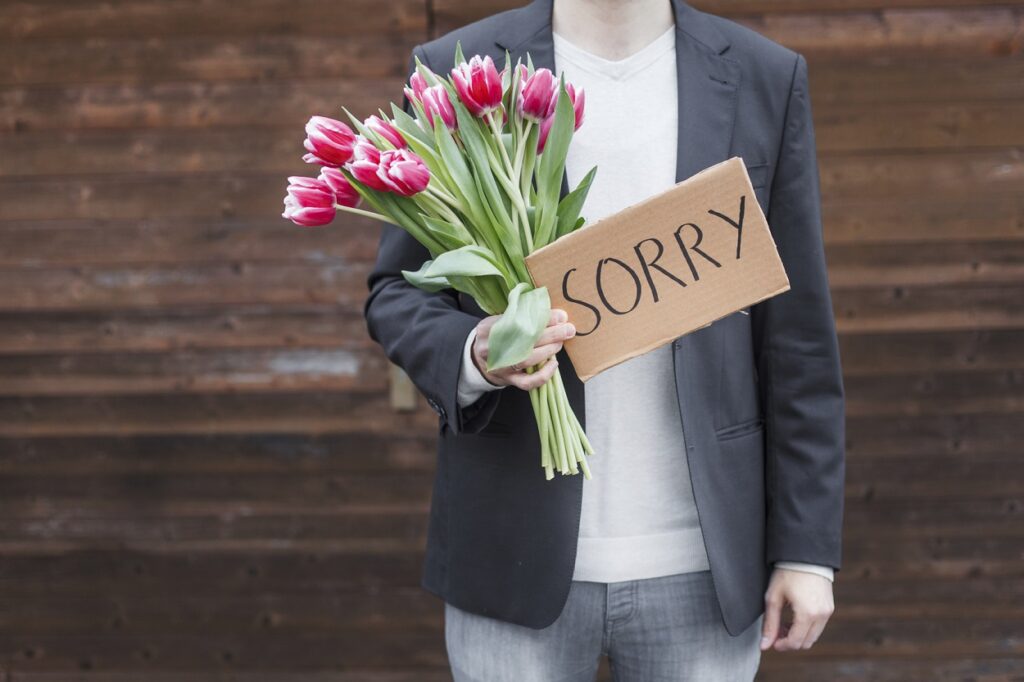The word “sorry” means many things to many people. In this article, Anna Shields, co-founder of Consensio, talks about the impact of an apology in the context of workplace mediation and how this can be applied in many types of courageous conversations.
Sorry. Even if the word itself doesn’t actually come up, it’s usually there beneath the surface in most workplace mediation conversations; and it can have a significant effect on the outcomes.
I remember one mediation where a colleague told his manager how much he’d suffered as a result of certain comments the manager had made.
The manager responded by saying: “Actually, that happened to me at one of my previous jobs and it was awful. I can’t believe that I did the same to you and I’m really sorry.”
The manager used the conversation as an opportunity to gain a new insight into herself.
She was surprised to discover that she had repeated the same mistake someone else had made with her. Her apology was both spontaneous and heartfelt and, as a result, made a profound difference to the conversation.
In another case, an employee had requested to be moved to another department but this was denied by her Head of Department.
The employee then went on stress leave and relations between the two parties suffered. During the subsequent mediation, the manager said: “In retrospect, I should have moved you and I’m sorry”. The manager was also able to explain how the employee’s absence had affected his workload.
On one occasion, an apology was offered but the response was “I do not accept your apology.”
The employee responded by saying: “Thank you for the apology. I’m also sorry – I hadn’t realised how much my absence had affected you.” In this case, the apology triggered an apology from the other person and led to greater understanding on both sides.
But it doesn’t always go so smoothly. On one occasion, an apology was offered but the response was “I do not accept your apology.”
Likewise, I remember a colleague apologising to a co-worker. I asked the co-worker if that was what she wanted and her response was “no”. These are good reminders that the word “sorry” on its own will not necessarily solve anything. There has to be something behind it.
What do they want from an apology?
There are various elements that people look for in an apology. Very often people are looking for empathy or compassion. They want to feel that they have been heard and understood by the other person. Another element people seek is an acknowledgement of responsibility.
They want to see the other person taking responsibility for what has happened. Thirdly, people want to know that it isn’t going to happen again – they want evidence that the other person will behave differently in the future.
Firstly, don’t get too attached to the need for an apology.
So, what advice would I give to people going into a difficult conversation, seeking or offering an apology?
Firstly, don’t get too attached to the need for an apology. Sometimes people go into a conversation thinking they want the other person to make a public apology in front of the whole department. But, as the conversation unfolds, they realise that isn’t what they want.
Dialogue can change things. It’s fine to have a goal, but be open to this goal changing as the conversation progresses and takes shape.
What type of apology do you want?
If you are seeking an apology, ask yourself what type of an apology you are looking for. Maybe what you need isn’t the word “sorry” but an explanation, or a commitment that it will not happen again. If you’re planning to offer an apology, think about what you are offering. Are you offering empathy? Are you accepting responsibility and if so, for what? Are you committing to acting differently in the future?
Next, remember that it’s not just what you say, but how you say it.
I often hear comments like “She’s going to apologise, but she’s not going to mean it”.
So, what can you do to make your apology come across as heartfelt and genuine?
Part of this relates to where and when the apology is given. A few comments given hastily on the way into a meeting may not have the same impact as an apology offered in a private meeting set up especially for the purpose.
There are some types of apologies to beware of. In our media-trained world, we often hear apologies like “I’m sorry if I caused offence” which does not acknowledge responsibility for what has happened. Another common one is the conditional apology, such as “I’m sorry but you need to understand…”, which can make the other person defensive and close down the dialogue.
Above all, don’t assume that the word “sorry” will solve everything. It’s a word that means different things to different people. “Sorry” works best when it is used as a way to increase mutual understanding of what has happened, how it has affected each person, and what type of relationship they hope to have in the future.
The word “sorry” means many things to many people. In this article, Anna Shields, co-founder of Consensio, talks about the impact of an apology in the context of workplace mediation and how this can be applied in many types of courageous conversations.
Sorry. Even if the word itself doesn’t actually come up, it’s usually there beneath the surface in most workplace mediation conversations; and it can have a significant effect on the outcomes.
I remember one mediation where a colleague told his manager how much he’d suffered as a result of certain comments the manager had made.
The manager responded by saying: “Actually, that happened to me at one of my previous jobs and it was awful. I can’t believe that I did the same to you and I’m really sorry.”
The manager used the conversation as an opportunity to gain a new insight into herself.
She was surprised to discover that she had repeated the same mistake someone else had made with her. Her apology was both spontaneous and heartfelt and, as a result, made a profound difference to the conversation.
In another case, an employee had requested to be moved to another department but this was denied by her Head of Department.
The employee then went on stress leave and relations between the two parties suffered. During the subsequent mediation, the manager said: “In retrospect, I should have moved you and I’m sorry”. The manager was also able to explain how the employee’s absence had affected his workload.
On one occasion, an apology was offered but the response was “I do not accept your apology.”
The employee responded by saying: “Thank you for the apology. I’m also sorry - I hadn’t realised how much my absence had affected you.” In this case, the apology triggered an apology from the other person and led to greater understanding on both sides.
But it doesn’t always go so smoothly. On one occasion, an apology was offered but the response was “I do not accept your apology.”
Likewise, I remember a colleague apologising to a co-worker. I asked the co-worker if that was what she wanted and her response was “no”. These are good reminders that the word “sorry” on its own will not necessarily solve anything. There has to be something behind it.
What do they want from an apology?
There are various elements that people look for in an apology. Very often people are looking for empathy or compassion. They want to feel that they have been heard and understood by the other person. Another element people seek is an acknowledgement of responsibility.
They want to see the other person taking responsibility for what has happened. Thirdly, people want to know that it isn’t going to happen again – they want evidence that the other person will behave differently in the future.
Firstly, don’t get too attached to the need for an apology.
So, what advice would I give to people going into a difficult conversation, seeking or offering an apology?
Firstly, don’t get too attached to the need for an apology. Sometimes people go into a conversation thinking they want the other person to make a public apology in front of the whole department. But, as the conversation unfolds, they realise that isn’t what they want.
Dialogue can change things. It’s fine to have a goal, but be open to this goal changing as the conversation progresses and takes shape.
What type of apology do you want?
If you are seeking an apology, ask yourself what type of an apology you are looking for. Maybe what you need isn’t the word “sorry” but an explanation, or a commitment that it will not happen again. If you’re planning to offer an apology, think about what you are offering. Are you offering empathy? Are you accepting responsibility and if so, for what? Are you committing to acting differently in the future?
Next, remember that it’s not just what you say, but how you say it.
I often hear comments like “She’s going to apologise, but she’s not going to mean it”.
So, what can you do to make your apology come across as heartfelt and genuine?
Part of this relates to where and when the apology is given. A few comments given hastily on the way into a meeting may not have the same impact as an apology offered in a private meeting set up especially for the purpose.
There are some types of apologies to beware of. In our media-trained world, we often hear apologies like “I’m sorry if I caused offence” which does not acknowledge responsibility for what has happened. Another common one is the conditional apology, such as “I’m sorry but you need to understand…”, which can make the other person defensive and close down the dialogue.
Above all, don’t assume that the word “sorry” will solve everything. It’s a word that means different things to different people. “Sorry” works best when it is used as a way to increase mutual understanding of what has happened, how it has affected each person, and what type of relationship they hope to have in the future.





